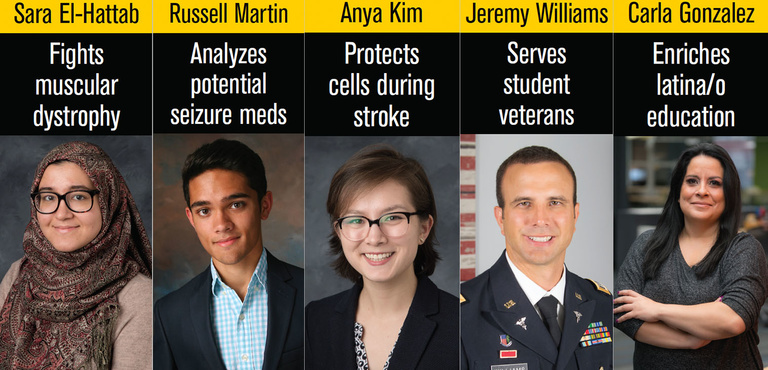University of Iowa students spend a lot of time hitting the books, sitting in lectures, and writing papers, but in between many are also helping to answer some of life’s most important and interesting questions as researchers and scholars.

To shine a light on their work, the UI Office of the Vice President for Research and Economic Development (OVPR&ED) is featuring 64 students in this year’s Dare to Discover banner series. The black-and-gold banners will be installed in early February throughout downtown Iowa City, and in the Old Capitol Mall/University Capitol Centre (UCC). They’ll remain up about six weeks before being installed throughout the Old Capitol Mall at least through the end of the spring semester.
Profiles for each student are available at: http://dare.research.uiowa.edu.
“We’re thrilled to be able to recognize so many students from such diverse disciplines who are contributing to the body of knowledge in everything from medicine and engineering to language and the arts,” said Interim Vice President for Research and Economic Development John Keller, who is also dean of the UI Graduate College. “These represent not only some of the University of Iowa’s brightest minds, but our country’s brightest future.”
Nearly 30 percent of undergraduates and virtually all graduate and post-graduate students are engaged in research and scholarship by the time they graduate, some supporting work by faculty, and others working on their own experiments and studies.
Bob Kirby, director of the Iowa Center for Research by Undergraduates (ICRU), said undergraduate students play an important role in supporting university research. Since 2010, ICRU has awarded more than $3.1 million to more than 1,400 students for fellowships.
“We commit more than $400,000 per year to student involvement in research through ICRU, and about 1,000 students are employed in paid research positions on campus in any given semester,” Kirby said. “Research is woven into the curriculum for many majors and meets the experiential learning requirement for our students who are members of the University Honors Program.”
Graduate students are also on the front lines of research discoveries and creative work across the university, in fields ranging from science, engineering, health and technology to the social sciences, arts, and humanities. Annually, about 1,300 graduate students are supported as graduate research assistants, many funded by external grants. Additionally, the Graduate College provides fellowship support to nearly 450 graduate students each year.
The students featured in this year’s Dare to Discover banner campaign come from across Iowa, the United States, and the world, and are working in labs and out in the field, running sophisticated experiments with state-of-the-art equipment and probing the origins of ancient texts.
Callie Ginapp, a fourth-year neurobiology major from Mason City, Iowa, is working with Gordon Buchanan, assistant professor of neurology in the UI’s Carver College of Medicine to study the role of CO2 (carbon dioxide)-induced arousal from sleep in sleep apnea and sudden infant death syndrome (SIDS).
Ginapp, who plans to attend medical school after graduation in May, says that gaining a “greater understanding of the biological mechanisms of sleep wake regulation will eventually allow for improved treatment” of these potentially deadly conditions.
Kayla Faust from Manchester, Iowa, is using a new, computer-based driving simulator for tractors to explore ways to keep farmers safer. She’s working with Carri Casteel, associate professor in the College of Public Health’s Occupational and Environmental Health department, and Daniel McGehee, associate professor of mechanical and industrial engineering and director of the National Advanced Driving Simulator.
She hopes to complete her doctorate in occupational and environmental health, with a focus on occupational injury prevention, in spring 2019.
“Among all the occupational industries in the United States, the agricultural industry has the highest rate of fatal and nonfatal injuries,” said Faust. “Because a majority of these are due to driving-related incidents, it is important to understand the factors that contribute to crash risks among farm equipment operators, which can also have important implications for driver safety in general since many tractor-involved crashes occur on public roadways and have severe outcomes.”
Egypt native Kareem Ebeid, who is working on a doctorate in pharmaceutics and expects to graduate in December 2018, is investigating the development and characterization of novel drug delivery systems capable of targeting and treating endometrial cancer.
“New therapies and therapeutic strategies are needed to improve the outcomes of this lethal cancer, which affects our mothers and grandmothers,” said Ebeid, who is working alongside Aliasger K. Salem, a professor of chemical and biomedical engineering and in the UI Holden Comprehensive Cancer Center, and is division head of UI Pharmaceutics and Translational Therapeutics. “Endometrial cancer is the most prevalent gynecological malignancy in the United States, with a continuous rise in both incidence and mortality over the past 10 years.”
Some student scholars, like Caitlin Marley of Akron, Ohio, are studying topics within the humanities, in her case Classics. Her faculty adviser is Paul Dilley, an assistant professor with a joint appointment in the Religious Studies and the Department of Classics in the College of Liberal Arts and Science.
"I apply natural language processing/digital humanities methodology to Latin prose, more specifically building the first Latin sentiment lexicon and performing a sentiment analysis of Cicero's speeches and personal letters,” Marley said, referring to the 1st Century BC Roman politician and lawyer who is considered one of Rome’s greatest orators and prose stylists.
“I am approaching a centuries-old study with 21st century techniques, giving the field a much-needed upgrade. And because I found a way to quantify ancient emotion, we can now track the ups and downs, and the sharing of ancient emotion, throughout Latin Literature.”
The Office of the Vice President for Research and Economic Development provides resources and support to researchers and scholars at the University of Iowa and to businesses across Iowa with the goal of forging new frontiers of discovery and innovation and promoting a culture of creativity that benefits the campus, the state, and the world. More at http://research.uiowa.edu, and on Twitter: @DaretoDiscover.